2023年外研版中考英语复习 第一节 同义词、近义词的归纳总结和辨析( 形容词、副词类辨析 )课件(共34张PPT)
文档属性
| 名称 | 2023年外研版中考英语复习 第一节 同义词、近义词的归纳总结和辨析( 形容词、副词类辨析 )课件(共34张PPT) |  | |
| 格式 | pptx | ||
| 文件大小 | 476.0KB | ||
| 资源类型 | 教案 | ||
| 版本资源 | 外研版 | ||
| 科目 | 英语 | ||
| 更新时间 | 2023-06-03 21:55:37 | ||
图片预览

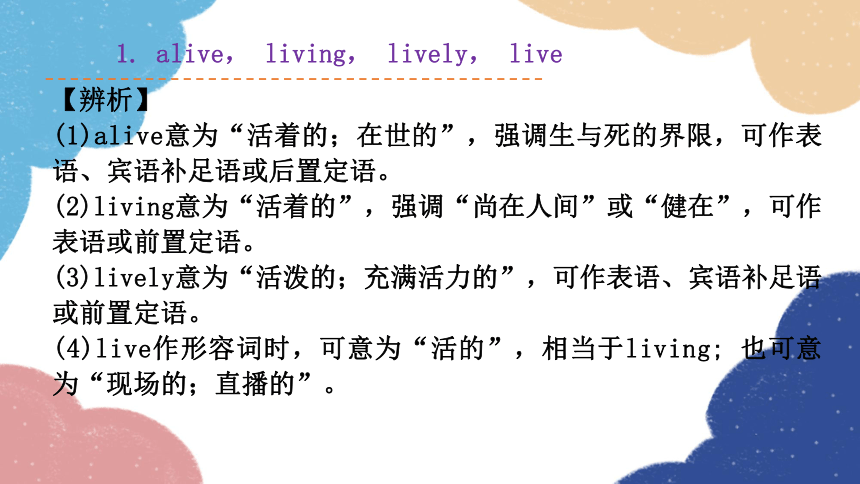

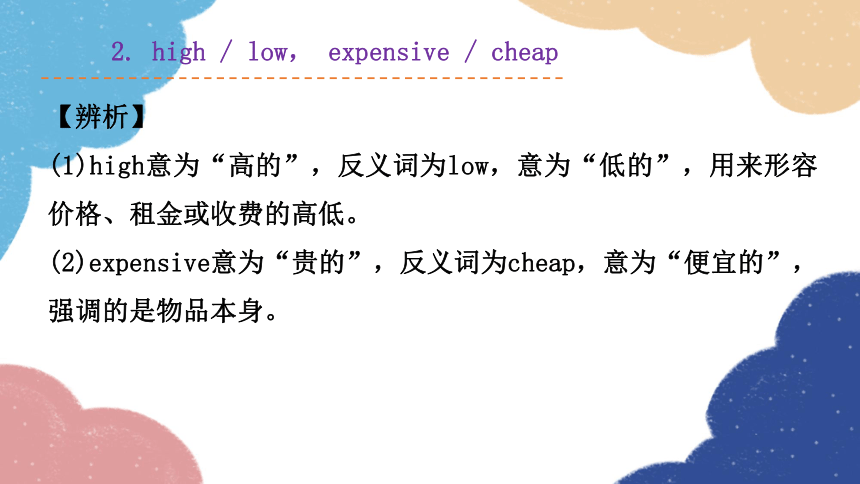
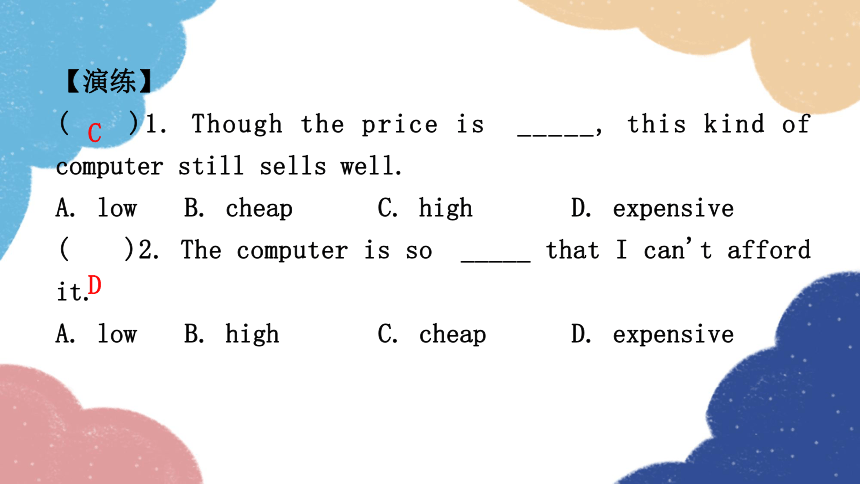

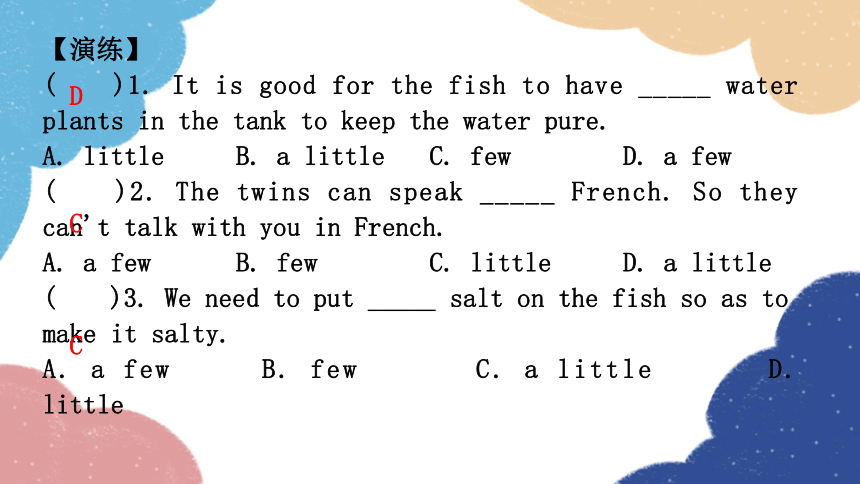
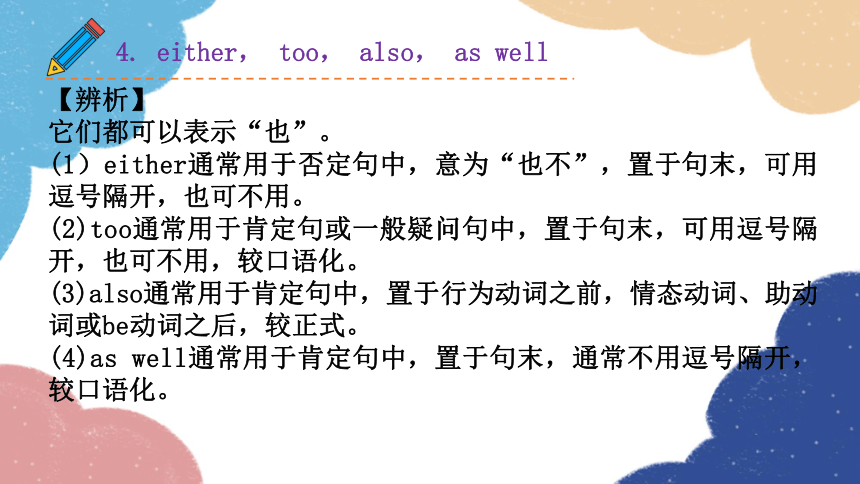
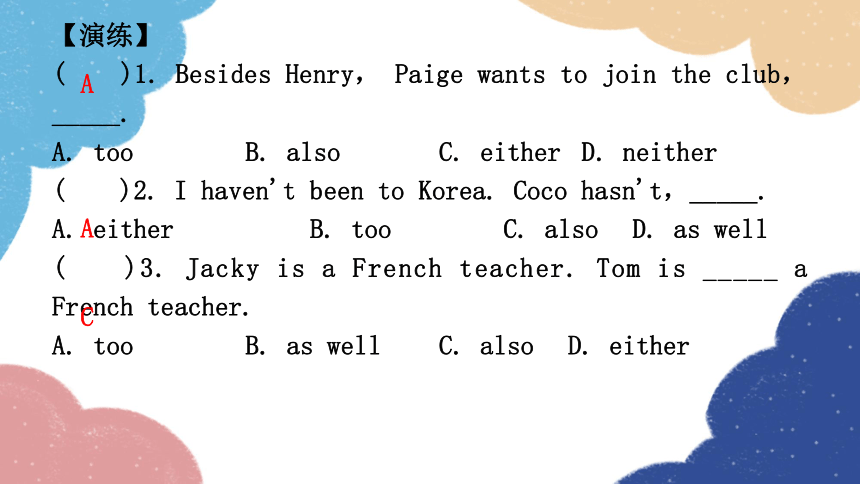
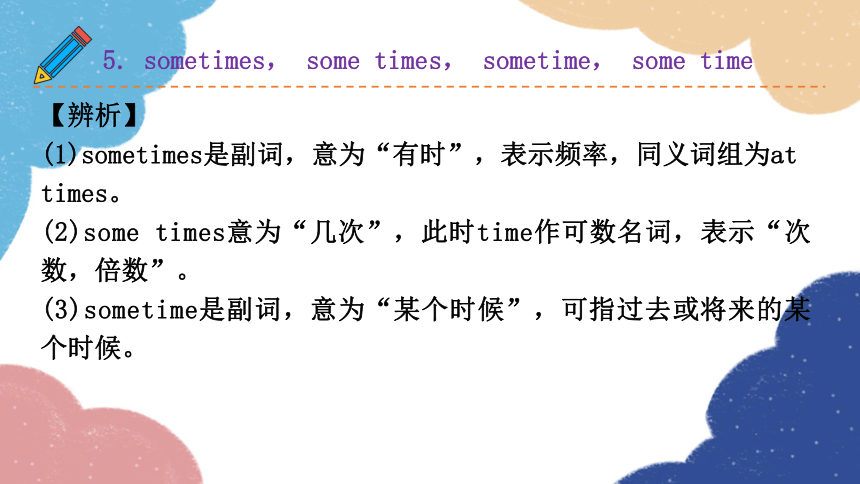
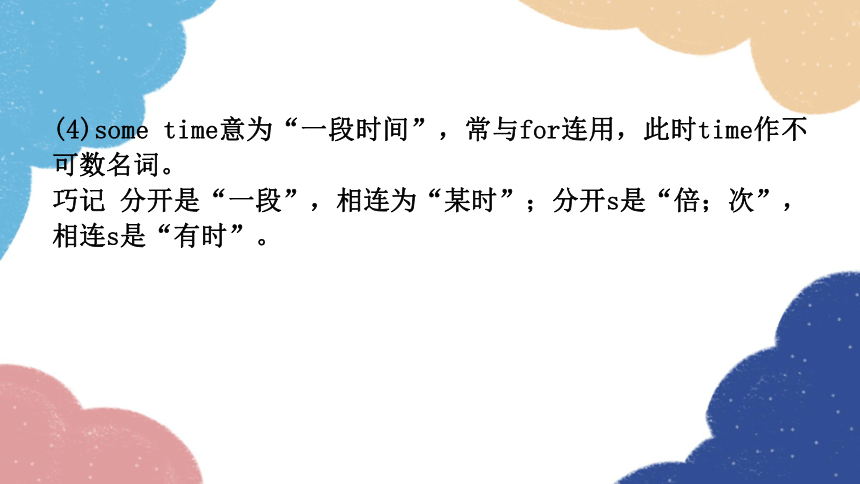
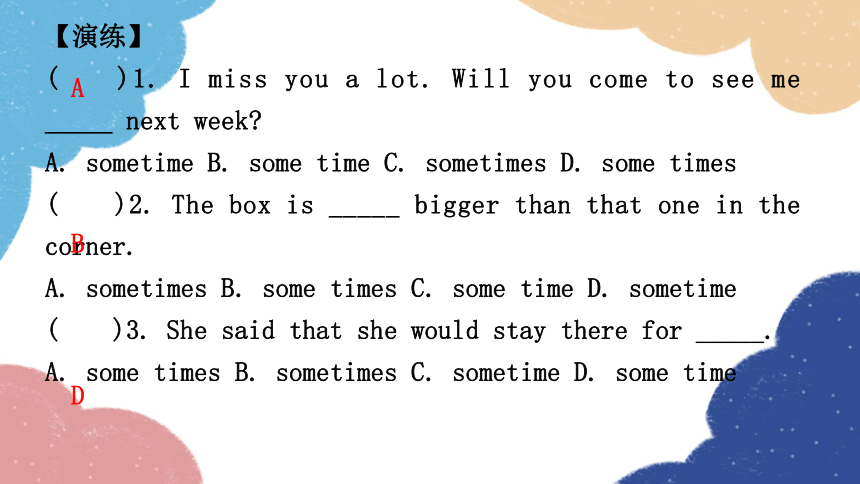
文档简介
(共34张PPT)
中考高频词汇突破
第一节 同义词、近义词的归纳总结和辨析
形容词、副词类辨析
【辨析】
(1)alive意为“活着的;在世的”,强调生与死的界限,可作表语、宾语补足语或后置定语。
(2)living意为“活着的”,强调“尚在人间”或“健在”,可作表语或前置定语。
(3)lively意为“活泼的;充满活力的”,可作表语、宾语补足语或前置定语。
(4)live作形容词时,可意为“活的”,相当于living; 也可意为“现场的;直播的”。
1. alive, living, lively, live
【演练】
( )1. He has many ways to make his class _____ and interesting.
A. living B. alive C. lively D. live
( )2. It's the most wonderful _____ football match that I have ever seen.
A. live B. lively C. alive D. living
( )3. All the adults were killed in the accident, but the two-year-old boy was _____.
A. alive B. live C. lively D. living
C
A
A
【辨析】
(1)high意为“高的”,反义词为low,意为“低的”,用来形容价格、租金或收费的高低。
(2)expensive意为“贵的”,反义词为cheap,意为“便宜的”,强调的是物品本身。
2. high / low, expensive / cheap
【演练】
( )1. Though the price is _____, this kind of computer still sells well.
A. low B. cheap C. high D. expensive
( )2. The computer is so _____ that I can't afford it.
A. low B. high C. cheap D. expensive
C
D
【辨析】
(1)a few后面接复数名词,表肯定意义,意为 “一些;几个”。
(2)few后面接复数名词,表否定意义,意为“几乎没有”。
(3)a little后面接不可数名词,表肯定意义,意为“一点;一些”。另外,a little还可作副词,后面接形容词、副词原级和比较级,如:a little fat有点胖,a little faster更快一点。
(4)little后面接不可数名词,表否定意义,意为“几乎没有”。
3. a few, few, a little, little
【演练】
( )1. It is good for the fish to have _____ water plants in the tank to keep the water pure.
A. little B. a little C. few D. a few
( )2. The twins can speak _____ French. So they can't talk with you in French.
A. a few B. few C. little D. a little
( )3. We need to put _____ salt on the fish so as to make it salty.
A. a few B. few C. a little D. little
D
C
C
【辨析】
它们都可以表示“也”。
(1)either通常用于否定句中,意为“也不”,置于句末,可用逗号隔开,也可不用。
(2)too通常用于肯定句或一般疑问句中,置于句末,可用逗号隔开,也可不用,较口语化。
(3)also通常用于肯定句中,置于行为动词之前,情态动词、助动词或be动词之后,较正式。
(4)as well通常用于肯定句中,置于句末,通常不用逗号隔开,较口语化。
4. either, too, also, as well
【演练】
( )1. Besides Henry, Paige wants to join the club,_____.
A. too B. also C. either D. neither
( )2. I haven't been to Korea. Coco hasn't,_____.
A. either B. too C. also D. as well
( )3. Jacky is a French teacher. Tom is _____ a French teacher.
A. too B. as well C. also D. either
A
A
C
【辨析】
(1)sometimes是副词,意为“有时”,表示频率,同义词组为at times。
(2)some times意为“几次”,此时time作可数名词,表示“次数,倍数”。
(3)sometime是副词,意为“某个时候”,可指过去或将来的某个时候。
5. sometimes, some times, sometime, some time
(4)some time意为“一段时间”,常与for连用,此时time作不可数名词。
巧记 分开是“一段”,相连为“某时”;分开s是“倍;次”,相连s是“有时”。
【演练】
( )1. I miss you a lot. Will you come to see me _____ next week
A. sometime B. some time C. sometimes D. some times
( )2. The box is _____ bigger than that one in the corner.
A. sometimes B. some times C. some time D. sometime
( )3. She said that she would stay there for _____.
A. some times B. sometimes C. sometime D. some time
A
B
D
【辨析】
(1)already意为“已经”,多置于肯定句的中间。already在疑问句中,常表示吃惊、意外的语气,此时already常置于句末。
(2)yet意为“已经;还”,常置于否定句或疑问句的末尾。
(3)still意为“仍然;还”,可用于各种句式中,且一般只置于句中。
6. already, yet, still
【演练】
( )1. Have you met your uncle at the airport _____?
A. yet B. still C. almost D. either
( )2. He has _____ set out for Beihai and now he may arrive there.
A. sometimes B. yet C. still D. already
( )3. Mr.Lin is looking for Tony. Is he _____ in the classroom?
A. already B. still C. never D. yet
A
D
B
【辨析】
(1)sleepy是形容词,意为“困乏的;昏昏欲睡的”,在句中可作定语或表语。
(2)asleep是形容词,意为“睡着的”,在句中只能作表语或宾语补足语,不能作定语,强调“睡着了”的状态。反义词是awake,意为“醒着的”。常见搭配有:fall asleep入睡。
(3)sleep作动词时,意为“睡觉”;作名词时,意为“睡眠”。
7. sleepy, asleep, sleep
【演练】
( )1. He goes to bed very late every day, so he often feels _____.
A. asleep B. awake C. sleepy D. sleep
( )2. The police found him _____ in a garage(车库).
A. asleep B. slept C. sleepy D. sleeps
( )3. I was too excited to go to _____.
A. sleep B. sleepy C. asleep D. sleepless
C
A
A
【辨析】
(1)ever意为“曾经”,常用于完成时的疑问句中。
(2)never意为“从不;未曾”,通常与表示肯定的动词连用。
(3)even意为“甚至;更”,后面常接形容词或副词的比较级,表示程度。
8. ever, never, even
【演练】
( )1. Gina isn't getting well. She is _____ worse today.
A. ever B. never C. even D. almost
( )2. —Have you _____ been to the Palace Museum
—Yes, I have been there twice.
A. never B. ever C. even D. forever
( )3. He is an honest boy. He _____ tells lies.
A. still B. ever C. even D. never
C
B
D
【辨析】
(1)whole意为“全部的;整体的”,常用来修饰可数名词单数形式,常置于冠词 (a, an, the)、单数指示代词、物主代词或所有格之后。
(2)all意为“所有的;全部的”,常用来修饰不可数名词或可数名词复数形式,常置于定冠词(the)、指示代词、物主代词或所有格之前。
9. whole, all
注意 time, day, month, year等表示时间的词均可以用whole或all来修饰,如:the whole time / all the time(在某段时间内)一直, the whole day / all day一整天。
【演练】
( )1. Dear students, please put _____ back to the bookshelf after you finish reading them.
A. the whole books B. the all books
C. all the books D. whole the books
( )2. _____ was excited and had a big party to celebrate the winning.
A. The whole team B. Whole the team
C. The all team D. All the team
C
A
【辨析】
(1)alone作形容词时,意为“单独的”,强调客观上独自一人,只能作表语。此外,alone还可作副词,意为“单独地;独自地”。
(2)lonely作形容词,意为“孤独的;寂寞的;荒凉的”,含有较浓的感彩,可作定语和表语。
10. alone, lonely
【演练】
( )1. The old peasant (农民) lives in a(n) _____ village far away, and he often feels _____.
A. alone; lonely B. lonely; lonely
C. alone; alone D. lonely; alone
( )2. The _____ girl was afraid of staying _____ in the _____ house.
A. alone; lonely; lonely B. lonely; lonely; alone
C. alone; alone; lonely D. lonely; alone; lonely
B
D
【辨析】
(1)everyday意为“每天的;日常的”,是形容词,后接名词。
(2)every day意为“每天”,是一个表示频率的副词词组。
11. everyday, every day
【演练】
( )1. Her _____ task is to water all the flowers in her office.
A. every day B. everyday C. probably D. usually
( )2. She can't accompany (陪伴) her son _____ because she is very busy.
A. everywhere B. everyday C. every day D. a day
B
C
【辨析】
(1)good是形容词,意为“好的;愉快的”。
(2)well是副词,意为“很好地;充分地”。well也可用作形容词,意为“良好的;健康的”。
12. good, well
【演练】
( )1. Bob, I don't feel _____ this morning. I have to see a doctor.
A. nicely B. well C. good D. badly
( )2. Traveling provides _____ chances for us to meet people from other countries.
A. wonderfully B. terrible C. good D. well
B
C
【辨析】
两者都可表示“别的;其他的”。
(1)other在句子中作定语,它通常修饰可数名词复数形式,且置于被修饰的名词之前。
(2)else用来修饰something, anything, nothing, nobody, anybody等复合不定代词或who, whose, what, when, where等特殊疑问词,且置于这些词之后。
13. other, else
【演练】
( )1. It sells milk, butter, cheese, eggs, and _____.
A. else things B. things else
C. things other D. other things
( )2. Besides the yellow toy car, what _____ do you need?
A. toys other B. else C. else toys D. other
D
B
【辨析】
(1)hard作形容词时,意为“困难的;艰苦的;硬的”;作副词时,意为“努力地;猛烈地”。
(2)hardly只能用作副词,意为“几乎不”,表示否定概念,置于实义动词之前,情态动词、助动词或be动词之后,不能与not或其他否定词连用。
14. hard, hardly
【演练】
( )1. It was raining _____. People could _____ go out.
A. hardly; hardly B. hard; hard
C. hard; hardly D. hardly; hard
( )2. —How often do you go shopping
—_____ ever. I don't like shopping.
A. Hardly B. Never C. Seldom D. Always
C
A
【辨析】
(1)以后缀-ing结尾的形容词可以用于说明事物或人物,表示事物或人物的性质或特征。如:interesting有趣的,exciting令人兴奋的。
(2)以后缀-ed结尾的形容词通常用于说明人,指人对事物的感受。如:interested感兴趣的,excited兴奋的。
15. -ing形容词, -ed形容词
【演练】
( )1. The movie is so _____. We all feel _____.
A. bored; bored B. bored; boring
C. boring; boring D. boring; bored
( )2. It was such _____ news that everyone cheered up.
A. exciting B. excited
C. excite D. excitedly
D
A
THANKS!
中考高频词汇突破
第一节 同义词、近义词的归纳总结和辨析
形容词、副词类辨析
【辨析】
(1)alive意为“活着的;在世的”,强调生与死的界限,可作表语、宾语补足语或后置定语。
(2)living意为“活着的”,强调“尚在人间”或“健在”,可作表语或前置定语。
(3)lively意为“活泼的;充满活力的”,可作表语、宾语补足语或前置定语。
(4)live作形容词时,可意为“活的”,相当于living; 也可意为“现场的;直播的”。
1. alive, living, lively, live
【演练】
( )1. He has many ways to make his class _____ and interesting.
A. living B. alive C. lively D. live
( )2. It's the most wonderful _____ football match that I have ever seen.
A. live B. lively C. alive D. living
( )3. All the adults were killed in the accident, but the two-year-old boy was _____.
A. alive B. live C. lively D. living
C
A
A
【辨析】
(1)high意为“高的”,反义词为low,意为“低的”,用来形容价格、租金或收费的高低。
(2)expensive意为“贵的”,反义词为cheap,意为“便宜的”,强调的是物品本身。
2. high / low, expensive / cheap
【演练】
( )1. Though the price is _____, this kind of computer still sells well.
A. low B. cheap C. high D. expensive
( )2. The computer is so _____ that I can't afford it.
A. low B. high C. cheap D. expensive
C
D
【辨析】
(1)a few后面接复数名词,表肯定意义,意为 “一些;几个”。
(2)few后面接复数名词,表否定意义,意为“几乎没有”。
(3)a little后面接不可数名词,表肯定意义,意为“一点;一些”。另外,a little还可作副词,后面接形容词、副词原级和比较级,如:a little fat有点胖,a little faster更快一点。
(4)little后面接不可数名词,表否定意义,意为“几乎没有”。
3. a few, few, a little, little
【演练】
( )1. It is good for the fish to have _____ water plants in the tank to keep the water pure.
A. little B. a little C. few D. a few
( )2. The twins can speak _____ French. So they can't talk with you in French.
A. a few B. few C. little D. a little
( )3. We need to put _____ salt on the fish so as to make it salty.
A. a few B. few C. a little D. little
D
C
C
【辨析】
它们都可以表示“也”。
(1)either通常用于否定句中,意为“也不”,置于句末,可用逗号隔开,也可不用。
(2)too通常用于肯定句或一般疑问句中,置于句末,可用逗号隔开,也可不用,较口语化。
(3)also通常用于肯定句中,置于行为动词之前,情态动词、助动词或be动词之后,较正式。
(4)as well通常用于肯定句中,置于句末,通常不用逗号隔开,较口语化。
4. either, too, also, as well
【演练】
( )1. Besides Henry, Paige wants to join the club,_____.
A. too B. also C. either D. neither
( )2. I haven't been to Korea. Coco hasn't,_____.
A. either B. too C. also D. as well
( )3. Jacky is a French teacher. Tom is _____ a French teacher.
A. too B. as well C. also D. either
A
A
C
【辨析】
(1)sometimes是副词,意为“有时”,表示频率,同义词组为at times。
(2)some times意为“几次”,此时time作可数名词,表示“次数,倍数”。
(3)sometime是副词,意为“某个时候”,可指过去或将来的某个时候。
5. sometimes, some times, sometime, some time
(4)some time意为“一段时间”,常与for连用,此时time作不可数名词。
巧记 分开是“一段”,相连为“某时”;分开s是“倍;次”,相连s是“有时”。
【演练】
( )1. I miss you a lot. Will you come to see me _____ next week
A. sometime B. some time C. sometimes D. some times
( )2. The box is _____ bigger than that one in the corner.
A. sometimes B. some times C. some time D. sometime
( )3. She said that she would stay there for _____.
A. some times B. sometimes C. sometime D. some time
A
B
D
【辨析】
(1)already意为“已经”,多置于肯定句的中间。already在疑问句中,常表示吃惊、意外的语气,此时already常置于句末。
(2)yet意为“已经;还”,常置于否定句或疑问句的末尾。
(3)still意为“仍然;还”,可用于各种句式中,且一般只置于句中。
6. already, yet, still
【演练】
( )1. Have you met your uncle at the airport _____?
A. yet B. still C. almost D. either
( )2. He has _____ set out for Beihai and now he may arrive there.
A. sometimes B. yet C. still D. already
( )3. Mr.Lin is looking for Tony. Is he _____ in the classroom?
A. already B. still C. never D. yet
A
D
B
【辨析】
(1)sleepy是形容词,意为“困乏的;昏昏欲睡的”,在句中可作定语或表语。
(2)asleep是形容词,意为“睡着的”,在句中只能作表语或宾语补足语,不能作定语,强调“睡着了”的状态。反义词是awake,意为“醒着的”。常见搭配有:fall asleep入睡。
(3)sleep作动词时,意为“睡觉”;作名词时,意为“睡眠”。
7. sleepy, asleep, sleep
【演练】
( )1. He goes to bed very late every day, so he often feels _____.
A. asleep B. awake C. sleepy D. sleep
( )2. The police found him _____ in a garage(车库).
A. asleep B. slept C. sleepy D. sleeps
( )3. I was too excited to go to _____.
A. sleep B. sleepy C. asleep D. sleepless
C
A
A
【辨析】
(1)ever意为“曾经”,常用于完成时的疑问句中。
(2)never意为“从不;未曾”,通常与表示肯定的动词连用。
(3)even意为“甚至;更”,后面常接形容词或副词的比较级,表示程度。
8. ever, never, even
【演练】
( )1. Gina isn't getting well. She is _____ worse today.
A. ever B. never C. even D. almost
( )2. —Have you _____ been to the Palace Museum
—Yes, I have been there twice.
A. never B. ever C. even D. forever
( )3. He is an honest boy. He _____ tells lies.
A. still B. ever C. even D. never
C
B
D
【辨析】
(1)whole意为“全部的;整体的”,常用来修饰可数名词单数形式,常置于冠词 (a, an, the)、单数指示代词、物主代词或所有格之后。
(2)all意为“所有的;全部的”,常用来修饰不可数名词或可数名词复数形式,常置于定冠词(the)、指示代词、物主代词或所有格之前。
9. whole, all
注意 time, day, month, year等表示时间的词均可以用whole或all来修饰,如:the whole time / all the time(在某段时间内)一直, the whole day / all day一整天。
【演练】
( )1. Dear students, please put _____ back to the bookshelf after you finish reading them.
A. the whole books B. the all books
C. all the books D. whole the books
( )2. _____ was excited and had a big party to celebrate the winning.
A. The whole team B. Whole the team
C. The all team D. All the team
C
A
【辨析】
(1)alone作形容词时,意为“单独的”,强调客观上独自一人,只能作表语。此外,alone还可作副词,意为“单独地;独自地”。
(2)lonely作形容词,意为“孤独的;寂寞的;荒凉的”,含有较浓的感彩,可作定语和表语。
10. alone, lonely
【演练】
( )1. The old peasant (农民) lives in a(n) _____ village far away, and he often feels _____.
A. alone; lonely B. lonely; lonely
C. alone; alone D. lonely; alone
( )2. The _____ girl was afraid of staying _____ in the _____ house.
A. alone; lonely; lonely B. lonely; lonely; alone
C. alone; alone; lonely D. lonely; alone; lonely
B
D
【辨析】
(1)everyday意为“每天的;日常的”,是形容词,后接名词。
(2)every day意为“每天”,是一个表示频率的副词词组。
11. everyday, every day
【演练】
( )1. Her _____ task is to water all the flowers in her office.
A. every day B. everyday C. probably D. usually
( )2. She can't accompany (陪伴) her son _____ because she is very busy.
A. everywhere B. everyday C. every day D. a day
B
C
【辨析】
(1)good是形容词,意为“好的;愉快的”。
(2)well是副词,意为“很好地;充分地”。well也可用作形容词,意为“良好的;健康的”。
12. good, well
【演练】
( )1. Bob, I don't feel _____ this morning. I have to see a doctor.
A. nicely B. well C. good D. badly
( )2. Traveling provides _____ chances for us to meet people from other countries.
A. wonderfully B. terrible C. good D. well
B
C
【辨析】
两者都可表示“别的;其他的”。
(1)other在句子中作定语,它通常修饰可数名词复数形式,且置于被修饰的名词之前。
(2)else用来修饰something, anything, nothing, nobody, anybody等复合不定代词或who, whose, what, when, where等特殊疑问词,且置于这些词之后。
13. other, else
【演练】
( )1. It sells milk, butter, cheese, eggs, and _____.
A. else things B. things else
C. things other D. other things
( )2. Besides the yellow toy car, what _____ do you need?
A. toys other B. else C. else toys D. other
D
B
【辨析】
(1)hard作形容词时,意为“困难的;艰苦的;硬的”;作副词时,意为“努力地;猛烈地”。
(2)hardly只能用作副词,意为“几乎不”,表示否定概念,置于实义动词之前,情态动词、助动词或be动词之后,不能与not或其他否定词连用。
14. hard, hardly
【演练】
( )1. It was raining _____. People could _____ go out.
A. hardly; hardly B. hard; hard
C. hard; hardly D. hardly; hard
( )2. —How often do you go shopping
—_____ ever. I don't like shopping.
A. Hardly B. Never C. Seldom D. Always
C
A
【辨析】
(1)以后缀-ing结尾的形容词可以用于说明事物或人物,表示事物或人物的性质或特征。如:interesting有趣的,exciting令人兴奋的。
(2)以后缀-ed结尾的形容词通常用于说明人,指人对事物的感受。如:interested感兴趣的,excited兴奋的。
15. -ing形容词, -ed形容词
【演练】
( )1. The movie is so _____. We all feel _____.
A. bored; bored B. bored; boring
C. boring; boring D. boring; bored
( )2. It was such _____ news that everyone cheered up.
A. exciting B. excited
C. excite D. excitedly
D
A
THANKS!
同课章节目录
- 词法
- 名词
- 动词和动词短语
- 动词语态
- 动词时态
- 助动词和情态动词
- 非谓语动词
- 冠词
- 代词
- 数词和量词
- 形容词副词及其比较等级
- 介词和介词短语
- 连词和感叹词
- 构词法
- 相似、相近词比较
- 句法
- 陈述句
- 一般疑问句和否定疑问句
- 特殊疑问句及选择疑问句
- 反意疑问句
- 存在句(There be句型)
- 宾语从句
- 定语从句
- 状语从句
- 主谓一致问题
- 简单句
- 并列句
- 复合句
- 主谓一致
- 主、表语从句
- 名词性从句
- 直接引语和间接引语
- 虚拟语气
- 感叹句
- 强调句
- 倒装句
- 祈使句
- 句子的成分
- 句子的分类
- 题型专区
- 单项选择部分
- 易错题
- 完形填空
- 阅读理解
- 词汇练习
- 听说训练
- 句型转换
- 补全对话
- 短文改错
- 翻译
- 书面表达
- 任务型阅读
- 语法填空
- 其他资料
